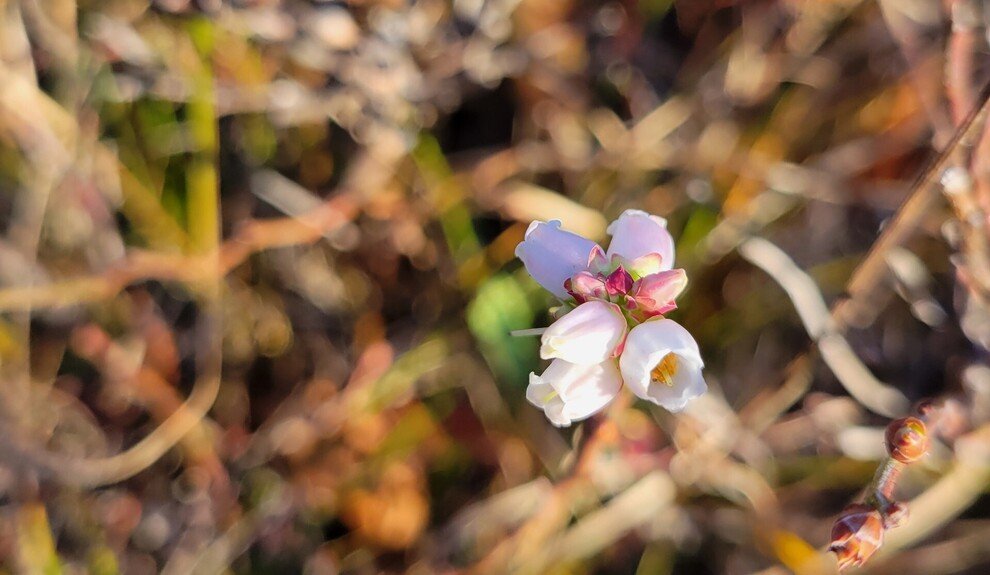
Research at LLNF
Research at the Linda Loring Nature Foundation focuses on studies that promote our mission to preserve, protect, and understand Nantucket's biologically diverse ecosystems. To that aim, our research program includes in-house studies on the island’s flora and fauna while also supporting the research of others who use the LLNF property as a “living laboratory”. We collaborate on innovative studies both on and off-island broadening our scientific reach.
Current Projects
Fresh Water Turtle Population Survey
During spring and fall, LLNF collects data on freshwater turtle populations living on the property. While our main focus is the spotted turtle, which was once considered a species of “Special Concern” in Massachusetts, we also gather information on eastern painted turtles and common snapping turtles to learn about their populations, habitat use, and nesting preferences.
Water Quality Monitoring
In 2019, LLNF expanded its property, gaining important shoreline areas on the North Head of Long Pond. We initially examined the pond's salinity, temperature, wetland plants, and aquatic life, but now focus on detailed sampling of water chemistry. By combining this data with information from our water level meters, seine netting, and minnow trapping, LLNF aims to better understand how the tidal changes in Long Pond affect the local ecosystem.
Sandplain grassland network
LLNF helped to found the Sandplain Grassland Network (SGN) in 2016. The SGN is a regional partnership among researchers and managers that formed to advance understanding and effectiveness of the management of sandplain grasslands. The SGN shares methods and understanding gained from experiences with managing grasslands across the region as well as through extensive literature reviews (published and gray literature). Check out the SGN website and guidance document.
Phenology - field observations
LLNF uses the National Phenology Network (NPN) protocols to investigate how our native species are responding to changes in climate. Since 2014 we have been tracking native shrubs species as well as the native eastern tent caterpillar. Phenology is a key indicator of the effects of climate change on ecological communities. LLNF data can be accessed via the NPN database.
Migratory Bird Banding
In 2024, LLNF opened a new bird banding station on our beautiful grounds. Our primary aim is to band and subsequently recapture songbirds in order to gather crucial data on their population numbers, overall health, and migration patterns. This valuable information will significantly enhance our understanding of their habitat use and will help us answer a variety of important questions regarding migratory birds that frequent the island. For further information and to visit the station, click here.
Rare species monitoring
We monitor populations of rare and endangered species on a regular schedule throughout our property at LLNF. In some cases, we also protect plants from deer browse and other hazards. All occurrence information is reported to the Mass Natural Heritage Endangered Species Program.
For specific questions about rare and lsited species at LLNF, contact Dr. Sarah Bois: stbois@llnf.org
Tree Swallow Nest Box Monitoring
LLNF engages in a long-term study of breeding birds by investigating the timing and reproductive success of Tree Swallows using nest boxes located throughout the property. Tree swallows are of particular interest as their populations are on the decline. By monitoring these birds, LLNF aims to increase our understanding of how climate and environmental changes affect reproductive behavior and inform our conservation efforts.
Weather Research
We have four weather stations on our property. Since 2014, we have collected rainfall data for the Community Collaborative Rain, Hail, and Snow Network. We also participate in the NOAA Cooperative Weather Observer program, one of the largest weather networks in the U.S. The Nantucket Land Council manages the National Atmospheric Deposition program collector on our land, and we added a new weather station in 2023 to monitor weather conditions at LLNF. Click here to learn more about our weather research programs.
Past Projects
Snake diversity
The Nantucket Snake Consortium (NSC) is a collaborative group that works to study the diversity of native snakes on Nantucket. Working island-wide with other conservation groups, we can answer more questions about snake diversity, snake health, and conservation of native species.
Pollinators in xeric grasslands
The LLNF is part of a regional pollinator project investigating pollinator diversity in xeric grasslands throughout the Atlantic coast. This regional network of experimental adaptive management sites was established in 2018 with funding awarded through the Northeast Regional Conservation Needs Program. This group will coordinate management and monitoring of native pollinators and their habitats leading to management improvements over time.
HPAI Sampling
LLNF studied the HPAI H5N1 outbreak by collecting samples from resident and migratory songbirds. Done in partnership with researchers from the University of Massachusetts Boston and Tufts University’s Cummings School of Veterinary Medicine.
For current information on HPAI visit: APHIS USDA
Science Pub recording of project: Link
Phenology - twig Warming
To complement our field phenology observations, LLNF conducts winter twig experiments. Since 2017, these experiments have been used to mimic earlier and earlier spring-like temperatures, as predicted in our region with global climate change. These experiments have also been used in our volunteer and educational programs.
Check out a 2018 scientific poster describing this research.
White-tailed deer genetics
Assisting with the work of Dr. Rick Beckett and his students, LLNF worked to collect DNA samples from white-tailed deer around the island. Using mitochondrial DNA sequence variation, which tracks maternal inheritance, preliminary results support the hypothesis that most of the deer on Nantucket are descendants of deer from Michigan.
Science Pub recording of research: link
Popular Science article: link














